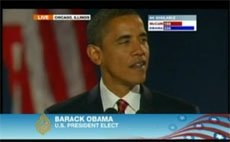Al Jazeera English’s election night coverage had the feel of a local college TV station, marking another missed opportunity for the channel that has yet to live up to its potential to produce true borderless journalism, writes Publisher and Co-Editor Lawrence Pintak.
Read More »Revolutions Without Revolutionaries? Network Theory, Facebook, and the Egyptian Blogosphere
Facebook made a splash when it attracted 70,000 members to a group supporting an Egyptian general strike. But were these committed activists or fly by night fans? David Faris on the politics of social networking sites.
Read More »Core to Commonplace: The evolution of Egypt’s blogosphere
A vanguard of techies and activists used blogs to change the face of politics and journalism in Egypt. But once a small town, Egypt’s blogosphere now resembles a sprawling metropolis with a less clearly defined center, argues Courtney C. Radsch.
Read More »Politics and priorities: Inside the Egyptian press
Pulitzer Prize-winning journalist Kenneth J. Cooper gets behind the headlines at three Egyptian dailies, looking at the politics and ideologies that drive coverage choices.
Read More »Lebanon’s media battle
Media were at the forefront of Lebanon’s bloodiest infighting since the civil war, relaying the heated words of politicians while beaming out propaganda thick and fast, writes Contributing Editor Paul Cochrane.
Read More »BOOK REVIEW | Arab Television Today
Drawing on Sakr’s deep and sophisticated industry expertise, the book is a must-read for anyone interested in the political economy of the Arab television industry, writes Youssef Masrieh.
Read More »BOOK REVIEW | Asad in Search of Legitimacy: Message and Rhetoric in the Syrian Press under Hafiz and Bashar
Side-by-side renderings of Arabic articles and their English translations make the book useful for students and researchers, yet crude generalizations and culturalist arguments deflect from Kedar’s analytical contributions, argues Book Review Editor Samer Abboud.
Read More »Lessons worth learning: The Indonesian model
Over the last two decades an explosion of new private outlets has dramatically changed Indonesia’s media landscape, writes Publisher and Co-Editor Lawrence Pintak. What lessons does this hold for the Arab press?
Read More »Arab youth, television and “affluenza”
Does high television viewing correlate with more materialistic values in the Arab World? Recent survey data suggest not, says Mark Harmon.
Read More »The voice of a commander and statesman: Bashir Gemayel
Contributing Editor Pete Ajemian traces the rhetoric and media techniques of Bashir Gemayel from his years as a military commander to the days before his assassination as president-elect of Lebanon. Featuring video and full English translations.
Read More » Arab Media & Society The Arab Media Hub
Arab Media & Society The Arab Media Hub










